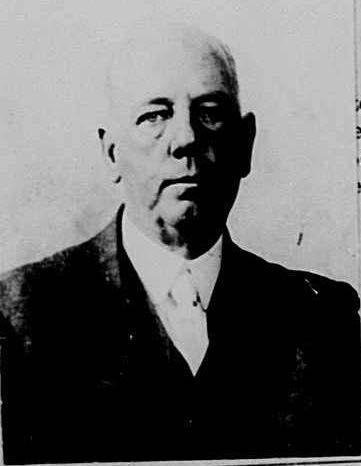Monday, February 5, 2018
Big brother
A few days ago I ended the post titled "The movie star in Weston Cemetery" with the promise to write a bit about the older brother of Jay Dwiggins, Elmer Dwiggins (b Oct 8, 1863). Elmer had been mentioned in that post as a partner with Jay in platting and selling the town of Griffin and also in a brokerage firm that went bankrupt in 1897.
Elmer married Matie C Wood of Sheldon, Indiana in 1890 and they had two sons, Raymond and Laurence. I cannot find the family in the 1900 Census, probably because they were not in the United States. In 1920 Elmer Dwiggins applied for a passport and on his application he stated that he had resided outside of the United States in England from 1898 to 1900 and in Argentina from 1900 to 1902. (The picture below is from this passport application. I could find no other picture of him on the Internet. He looks quite a bit like his brother Jay. The post on Jay, by the way, is the fifth most viewed page on this blog.)
One of the things he was doing while in England was writing. In 1899 under the pen name of Ellsworth Douglass he published a science fiction novel, Pharaoh's Broker: Being the Very Remarkable Experiences in Another World of Isidore Werner (Written by Himself). You can find original copies of the book on-line, but you probably will not want to pay the price of a copy. Alternatively, you can get a free digital copy via Project Gutenberg here.
I downloaded and read his book. It is well written. The story is told in first person narrative, with Isidore Werner, a Jewish commodities trader, being contacted by a professor from Germany who has invented an anti-gravity mechanism. The professor wants Werner to fund the building of a spaceship using his anti-gravity mechanism for a trip to Mars. After many pages of preparation, they are off. There are a number of other items that seem absurd to the modern understanding of space. For example, at the time many scientists believed that space was filled with a mysterious substance called ether, needed to allow light waves to be transmitted. In the book their craft used the resistance of ether to steer. They started in the shadow of the earth and the sky was black, but when they emerged from the shadow, the sky became bright.
When they reached Mars, they found that it was much like earth, but delayed in its development. They were able to communicate when they found a person who could speak Hebrew (which is why the narrator was Jewish). That person was the counterpart of Joseph in Egypt, and since they knew the Biblical story, they knew the Martian future and used it to their advantage. Eventually there was conflict and they narrowly escaped to travel back to Earth. (I hope I did not spoil the story for all of you who want to download and read the book.)
The Dwiggins family was in Iowa in about 1903 according to the 1905 Iowa Census. Elmer is working in insurance and this may be the start of his employment by Bankers' Life, which was headquartered in Des Moines.
In 1906 an ad appeared in the New York Daily Tribune for The Car de Lux, a luxury automobile being sold by Elmer Dwiggins. He had a temporary office and those interested could view the car at the Grand Central Palace Auto Show. The cost was $4750, which was several years wages for the ordinary person.
In the 1910 Census the family was living in Fort Lee, New Jersey, which is across the Hudson River from Manhattan Island. Elmer was dealing real estate and the family had a maid.
In 1911 Elmer's wife Mattie died. She is buried in Sheldon, Illinois in the lot with her parents. In 1912 Elmer married Ora Milliken Andrews.
In 1917 Elmer becoame newsworthy but not in a good way. There were articles in numerous papers about how his Liberty Bond investment club was short of funds. (The U.S. government used Liberty Bonds to fund World War I.) Rather than trying to summarize, below is typical of what was being written.
Some of the articles quoted his wife as saying, "I am a patriot first, a wife next."
The people who invested in the club lost nothing because Bankers' Life, Dwiggins' employer, made good on the shortfall. (If you want a larger version of any of these articles, click on them to open them in a new window.)
Dwiggins was convicted and sent to jail. In the 1920 Census he is listed as an prison inmate in Georgia. He was released in 1920 and by August was seeking a passport. He declared on the passport that he intended to travel to Mexico, Cuba, Jamaica, Panama, and Columbia selling American goods. He included a letter with his application from the A.A. Motor Truck Co. of Chicago indicating that he was going to be selling their trucks in Latin America. It is amazing how quickly he was back in business; he must have been quite the salesman.
Elmer Dwiggins—author, wheeler-dealer, felon—died in Los Angeles, California on September 11, 1933.
The Dwiggins family is a strong contender for the title of "Most Interesting Family to Come out of Rensselaer."
(Sources for the above are familysearch.org and chroniclingamerica.loc.gov/newspapers/.)
Updated.
Elmer married Matie C Wood of Sheldon, Indiana in 1890 and they had two sons, Raymond and Laurence. I cannot find the family in the 1900 Census, probably because they were not in the United States. In 1920 Elmer Dwiggins applied for a passport and on his application he stated that he had resided outside of the United States in England from 1898 to 1900 and in Argentina from 1900 to 1902. (The picture below is from this passport application. I could find no other picture of him on the Internet. He looks quite a bit like his brother Jay. The post on Jay, by the way, is the fifth most viewed page on this blog.)
One of the things he was doing while in England was writing. In 1899 under the pen name of Ellsworth Douglass he published a science fiction novel, Pharaoh's Broker: Being the Very Remarkable Experiences in Another World of Isidore Werner (Written by Himself). You can find original copies of the book on-line, but you probably will not want to pay the price of a copy. Alternatively, you can get a free digital copy via Project Gutenberg here.
I downloaded and read his book. It is well written. The story is told in first person narrative, with Isidore Werner, a Jewish commodities trader, being contacted by a professor from Germany who has invented an anti-gravity mechanism. The professor wants Werner to fund the building of a spaceship using his anti-gravity mechanism for a trip to Mars. After many pages of preparation, they are off. There are a number of other items that seem absurd to the modern understanding of space. For example, at the time many scientists believed that space was filled with a mysterious substance called ether, needed to allow light waves to be transmitted. In the book their craft used the resistance of ether to steer. They started in the shadow of the earth and the sky was black, but when they emerged from the shadow, the sky became bright.
When they reached Mars, they found that it was much like earth, but delayed in its development. They were able to communicate when they found a person who could speak Hebrew (which is why the narrator was Jewish). That person was the counterpart of Joseph in Egypt, and since they knew the Biblical story, they knew the Martian future and used it to their advantage. Eventually there was conflict and they narrowly escaped to travel back to Earth. (I hope I did not spoil the story for all of you who want to download and read the book.)
The Dwiggins family was in Iowa in about 1903 according to the 1905 Iowa Census. Elmer is working in insurance and this may be the start of his employment by Bankers' Life, which was headquartered in Des Moines.
In 1906 an ad appeared in the New York Daily Tribune for The Car de Lux, a luxury automobile being sold by Elmer Dwiggins. He had a temporary office and those interested could view the car at the Grand Central Palace Auto Show. The cost was $4750, which was several years wages for the ordinary person.
In the 1910 Census the family was living in Fort Lee, New Jersey, which is across the Hudson River from Manhattan Island. Elmer was dealing real estate and the family had a maid.
In 1911 Elmer's wife Mattie died. She is buried in Sheldon, Illinois in the lot with her parents. In 1912 Elmer married Ora Milliken Andrews.
In 1917 Elmer becoame newsworthy but not in a good way. There were articles in numerous papers about how his Liberty Bond investment club was short of funds. (The U.S. government used Liberty Bonds to fund World War I.) Rather than trying to summarize, below is typical of what was being written.
Some of the articles quoted his wife as saying, "I am a patriot first, a wife next."
The people who invested in the club lost nothing because Bankers' Life, Dwiggins' employer, made good on the shortfall. (If you want a larger version of any of these articles, click on them to open them in a new window.)
Dwiggins was convicted and sent to jail. In the 1920 Census he is listed as an prison inmate in Georgia. He was released in 1920 and by August was seeking a passport. He declared on the passport that he intended to travel to Mexico, Cuba, Jamaica, Panama, and Columbia selling American goods. He included a letter with his application from the A.A. Motor Truck Co. of Chicago indicating that he was going to be selling their trucks in Latin America. It is amazing how quickly he was back in business; he must have been quite the salesman.
Elmer Dwiggins—author, wheeler-dealer, felon—died in Los Angeles, California on September 11, 1933.
The Dwiggins family is a strong contender for the title of "Most Interesting Family to Come out of Rensselaer."
(Sources for the above are familysearch.org and chroniclingamerica.loc.gov/newspapers/.)
Updated.
Subscribe to:
Post Comments (Atom)







No comments:
Post a Comment